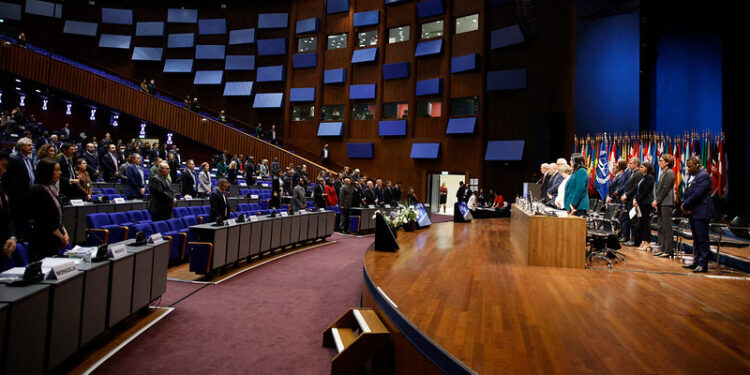This year’s session of the Assembly of States Parties (ASP) went well for the International Criminal Court, concluding with the adoption of a budget totalling €169,649,200 for the 2023 programme, the biggest increase in years.
Addressing the 21st session for the last time as the Registrar of the ICC when he presented the proposed programme budget, Peter Lewis stated that in 2023, the court will face an unprecedented workload in terms of both volume and complexity, with operations in 16 situations, three simultaneous trials in three courtrooms, six cases in trial and pre-trial, ongoing reparations proceedings in five cases, and at least 10 ongoing investigations.
“To deal with this workload, the court has proposed a total annual budget for 2023 of €186.8 million, an increase of about €32 million or 20.6 per cent over the current year,” he said.
The outgoing Registrar recalled the crucial need for states parties’ cooperation in matters of arrest and surrender, protection and relocation of witnesses, interim release, and financing of family visits through the trust fund.
Calls for renewed support for the ICC and enhanced cooperation to back strong international justice institutions dominated debate at the 21st ASP session, which was hosted at the World Forum Convention Centre in The Hague, the Netherlands, from December 5-9, 2022.
ASP President Silvia Fernández de Gurmendi stressed the ICC’s vital role in the international legal framework to ensure the accountability of perpetrators of atrocity crimes and bring justice to victims.
“The increased cooperation of states parties and the promotion of the work of the court are essential to achieve the global aspirations of the ICC’s mandate,” she said.
ICC President Piotr Hofmański called for enhanced cooperation from the states and an increased budget: “It is critically important to build capacity now so that we can cope effectively with the workload that awaits us,” he said.
He also stressed the importance of making the ICC system more universal and urged non-member states attending the ASP to take steps toward joining the Rome Statute “without delay”.
Hofmański said it has been 20 years since the court’s founding and the workload has reached unprecedented heights, with new trials and investigations. “Demands and expectations toward the ICC may be higher today than ever before,” he said.
He added that there is a need to work together to achieve the goals of accountability and justice, with full respect for the rule of law and fairness of proceedings.
You May Also Like: Ongwen appeal judgment set for December 15
“Cooperation lies at the heart of the Rome Statute system and is vitally important for the court’s functioning. As the ICC caseload increases, so does the need for voluntary cooperation agreements,” Hofmański said.
ICC Prosecutor Karim Khan underlined the need to deepen partnerships to render the collective work towards justice more effective: “My time thus far as Prosecutor has shown again and again that we will only achieve the true promise of the Rome Statute by working together, across all actors.”
He reminded participants that next year marks 25 years of the adoption of the Rome Statute and that “… there is a need for the law and the International Criminal Court more than ever”.
Minou Tavárez Mirabal, the chairperson of the board of directors of the Trust Fund for Victims (TFV), asked states parties to consider providing additional voluntary contributions, including development funding, for the benefit of victims and their families.
Two-thirds of the world’s countries have joined the Rome Statute marking a commitment to international law, peace, and security.
According to a statement by the United States of America, the Biden-Harris administration has continued rebuilding the US-ICC relationship, “…engaging constructively with the court and ASP members, and supporting the Rome Statute system across a wide range of situations, in a manner consistent with our laws, policy, values and enduring commitment to international justice”.
Acknowledging that the US signed the Rome Statute but not as a full party, the American delegation said the ICC is an essential part of the global system of justice and a key pillar of the fight against impunity for the worst crimes.
“The US pledges to enhance our efforts on these fronts, including through robust engagement and cooperation with the ICC and states parties,” Global Criminal Justice Ambassador Beth Van Schaack, who led the American delegation, said.
She further encouraged other friends of the court, parties, and non-party states alike to join the statute.
Ireland emphasised the need for support, the rights of victims, and the need to protect the court and civil society from all forms of attack.
The 22nd session of the Assembly will be held from December 4-14, 2023 at the United Nations Headquarters in New York.
Separately, Judge Hofmański marked the International Human Rights Day on December 10, 2022, reiterating his earlier call to all states that have not done so to join the Rome Statute, and those that have to support the ICC in its daily work.
He asked the states to also strengthen the capacity of their national jurisdictions to address the crime of genocide, crimes against humanity, war crimes, and crime of aggression, which the ICC is mandated to investigate and prosecute.
“We must work together toward shared goals in order to make real progress in eradicating impunity for the gravest crimes under international law. This is crucial for advancing the global enjoyment of universal human rights, which belong to all people without distinction,” Hofmański said in a statement.
International Human Rights Day commemorates the adoption of the Universal Declaration of Human Rights in 1948.







